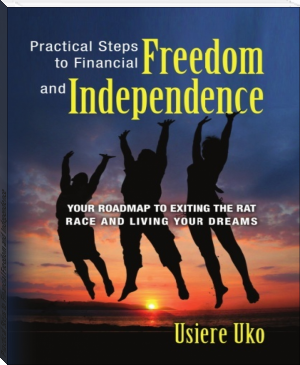Speeches - James Clear, Wolves Forever (good book recommendations txt) 📗

- Author: James Clear, Wolves Forever
Book online «Speeches - James Clear, Wolves Forever (good book recommendations txt) 📗». Author James Clear, Wolves Forever
One thing that made the study different from others is that the researchers didn’t test people’s cognitive functions while they were multitasking. They separated the subject group into high multitaskers and low multitaskers and used a different set of tests to measure the kinds of cognitive abilities involved in multitasking. They found that in every case the high multitaskers scored worse. They were worse at distinguishing between relevant and irrelevant information and ignoring the latter. In other words, they were more distractible. They were worse at what you might call “mental filing”: keeping information in the right conceptual boxes and being able to retrieve it quickly. In other words, their minds were more disorganized. And they were even worse at the very thing that defines multitasking itself: switching between tasks.
Multitasking, in short, is not only not thinking, it impairs your ability to think. Thinking means concentrating on one thing long enough to develop an idea about it. Not learning other people’s ideas, or memorizing a body of information, however much those may sometimes be useful. Developing your own ideas. In short, thinking for yourself. You simply cannot do that in bursts of 20 seconds at a time, constantly interrupted by Facebook messages or Twitter tweets, or fiddling with your iPod, or watching something on YouTube.
I find for myself that my first thought is never my best thought. My first thought is always someone else’s; it’s always what I’ve already heard about the subject, always the conventional wisdom. It’s only by concentrating, sticking to the question, being patient, letting all the parts of my mind come into play, that I arrive at an original idea. By giving my brain a chance to make associations, draw connections, take me by surprise. And often even that idea doesn’t turn out to be very good. I need time to think about it, too, to make mistakes and recognize them, to make false starts and correct them, to outlast my impulses, to defeat my desire to declare the job done and move on to the next thing.
I used to have students who bragged to me about how fast they wrote their papers. I would tell them that the great German novelist Thomas Mann said that a writer is someone for whom writing is more difficult than it is for other people. The best writers write much more slowly than everyone else, and the better they are, the slower they write. James Joyce wrote Ulysses, the greatest novel of the 20th century, at the rate of about a hundred words a day—half the length of the selection I read you earlier from Heart of Darkness—for seven years. T. S. Eliot, one of the greatest poets our country has ever produced, wrote about 150 pages of poetry over the course of his entire 25-year career. That’s half a page a month. So it is with any other form of thought. You do your best thinking by slowing down and concentrating.
Now that’s the third time I’ve used that word, concentrating. Concentrating, focusing. You can just as easily consider this lecture to be about concentration as about solitude. Think about what the word means. It means gathering yourself together into a single point rather than letting yourself be dispersed everywhere into a cloud of electronic and social input. It seems to me that Facebook and Twitter and YouTube—and just so you don’t think this is a generational thing, TV and radio and magazines and even newspapers, too—are all ultimately just an elaborate excuse to run away from yourself. To avoid the difficult and troubling questions that being human throws in your way. Am I doing the right thing with my life? Do I believe the things I was taught as a child? What do the words I live by—words like duty, honor, and country—really mean? Am I happy?
You and the members of the other service academies are in a unique position among college students, especially today. Not only do you know that you’re going to have a job when you graduate, you even know who your employer is going to be. But what happens after you fulfill your commitment to the Army? Unless you know who you are, how will you figure out what you want to do with the rest of your life? Unless you’re able to listen to yourself, to that quiet voice inside that tells you what you really care about, what you really believe in—indeed, how those things might be evolving under the pressure of your experiences. Students everywhere else agonize over these questions, and while you may not be doing so now, you are only postponing them for a few years.
Maybe some of you are agonizing over them now. Not everyone who starts here decides to finish here. It’s no wonder and no cause for shame. You are being put through the most demanding training anyone can ask of people your age, and you are committing yourself to work of awesome responsibility and mortal danger. The very rigor and regimentation to which you are quite properly subject here naturally has a tendency to make you lose touch with the passion that brought you here in the first place. I saw exactly the same kind of thing at Yale. It’s not that my students were robots. Quite the reverse. They were intensely idealistic, but the overwhelming weight of their practical responsibilities, all of those hoops they had to jump through, often made them lose sight of what those ideals were. Why they were doing it all in the first place.
So it’s perfectly natural to have doubts, or questions, or even just difficulties. The question is, what do you do with them? Do you suppress them, do you distract yourself from them, do you pretend they don’t exist? Or do you confront them directly, honestly, courageously? If you decide to do so, you will find that the answers to these dilemmas are not to be found on Twitter or Comedy Central or even in The New York Times. They can only be found within—without distractions, without peer pressure, in solitude.
But let me be clear that solitude doesn’t always have to mean introspection. Let’s go back to Heart of Darkness. It’s the solitude of concentration that saves Marlow amidst the madness of the Central Station. When he gets there he finds out that the steamboat he’s supposed to sail upriver has a giant hole in it, and no one is going to help him fix it. “I let him run on,” he says, “this papier-mâché Mephistopheles”—he’s talking not about the manager but his assistant, who’s even worse, since he’s still trying to kiss his way up the hierarchy, and who’s been raving away at him. You can think of him as the Internet, the ever-present social buzz, chattering away at you 24/7:
I let him run on, this papier-mâché Mephistopheles and it seemed to me that if I tried I could poke my forefinger through him, and would find nothing inside but a little loose dirt. . . .
It was a great comfort to turn from that chap to . . . the battered, twisted, ruined, tin-pot steamboat. . . . I had expended enough hard work on her to make me love her. No influential friend would have served me better. She had given me a chance to come out a bit—to find out what I could do. No, I don’t like work. I had rather laze about and think of all the fine things that can be done. I don’t like work—no man does—but I like what is in the work,—the chance to find yourself. Your own reality—for yourself, not for others—what no other man can ever know.
“The chance to find yourself.” Now that phrase, “finding yourself,” has acquired a bad reputation. It suggests an aimless liberal-arts college graduate—an English major, no doubt, someone who went to a place like Amherst or Pomona—who’s too spoiled to get a job and spends his time staring off into space. But here’s Marlow, a mariner, a ship’s captain. A more practical, hardheaded person you could not find. And I should say that Marlow’s creator, Conrad, spent 19 years as a merchant marine, eight of them as a ship’s captain, before he became a writer, so this wasn’t just some artist’s idea of a sailor. Marlow believes in the need to find yourself just as much as anyone does, and the way to do it, he says, is work, solitary work. Concentration. Climbing on that steamboat and spending a few uninterrupted hours hammering it into shape. Or building a house, or cooking a meal, or even writing a college paper, if you really put yourself into it.
“Your own reality—for yourself, not for others.” Thinking for yourself means finding yourself, finding your own reality. Here’s the other problem with Facebook and Twitter and even The New York Times. When you expose yourself to those things, especially in the constant way that people do now—older people as well as younger people—you are continuously bombarding yourself with a stream of other people’s thoughts. You are marinating yourself in the conventional wisdom. In other people’s reality: for others, not for yourself. You are creating a cacophony in which it is impossible to hear your own voice, whether it’s yourself you’re thinking about or anything else. That’s what Emerson meant when he said that “he who should inspire and lead his race must be defended from travelling with the souls of other men, from living, breathing, reading, and writing in the daily, time-worn yoke of their opinions.” Notice that he uses the word lead. Leadership means finding a new direction, not simply putting yourself at the front of the herd that’s heading toward the cliff.
So why is reading books any better than reading tweets or wall posts? Well, sometimes it isn’t. Sometimes, you need to put down your book, if only to think about what you’re reading, what you think about what you’re reading. But a book has two advantages over a tweet. First, the person who wrote it thought about it a lot more carefully. The book is the result of his solitude, his attempt to think for himself.
Second, most books are old. This is not a disadvantage: this is precisely what makes them valuable. They stand against the conventional wisdom of today simply because they’re not from today. Even if they merely reflect the conventional wisdom of their own day, they say something different from what you hear all the time. But the great books, the ones you find on a syllabus, the ones people have continued to read, don’t reflect the conventional wisdom of their day. They say things that have the permanent power to disrupt our habits of thought. They were revolutionary in their own time, and they are still revolutionary today. And when I say “revolutionary,” I am deliberately evoking the American Revolution, because it was a result of precisely this kind of independent thinking. Without solitude—the solitude of Adams and Jefferson and Hamilton and Madison and Thomas Paine—there would be





Comments (0)